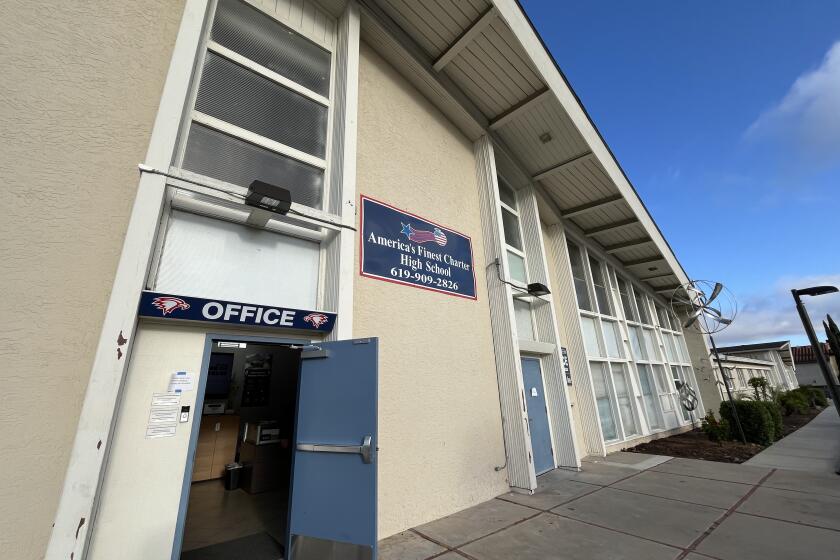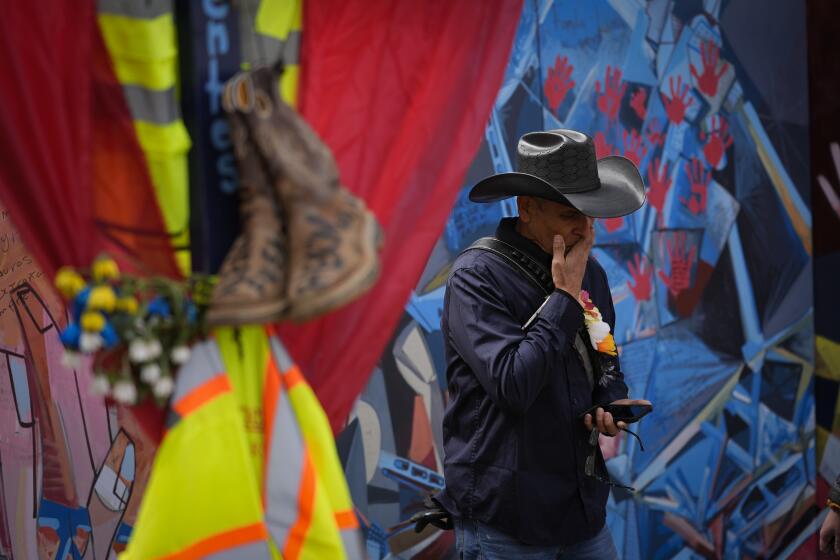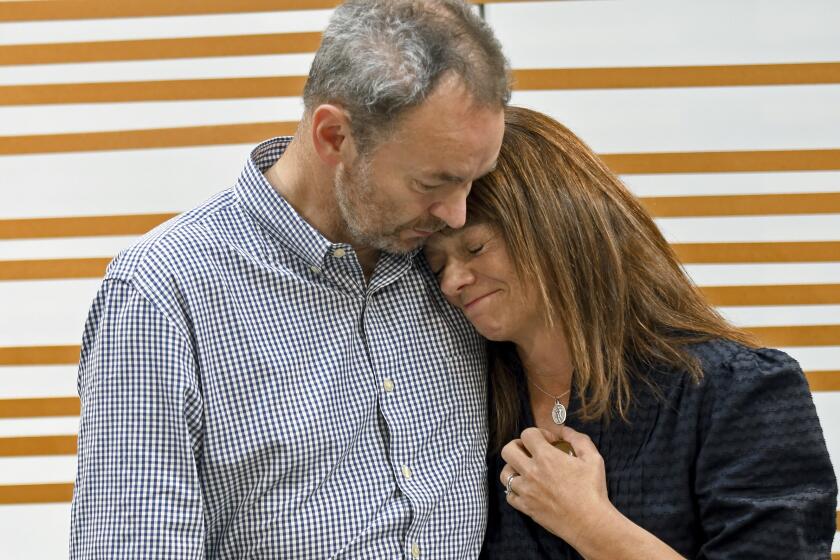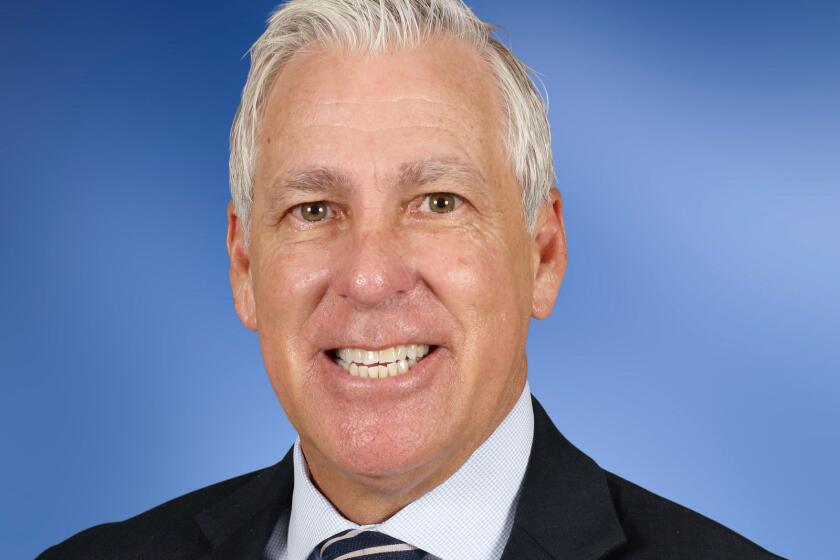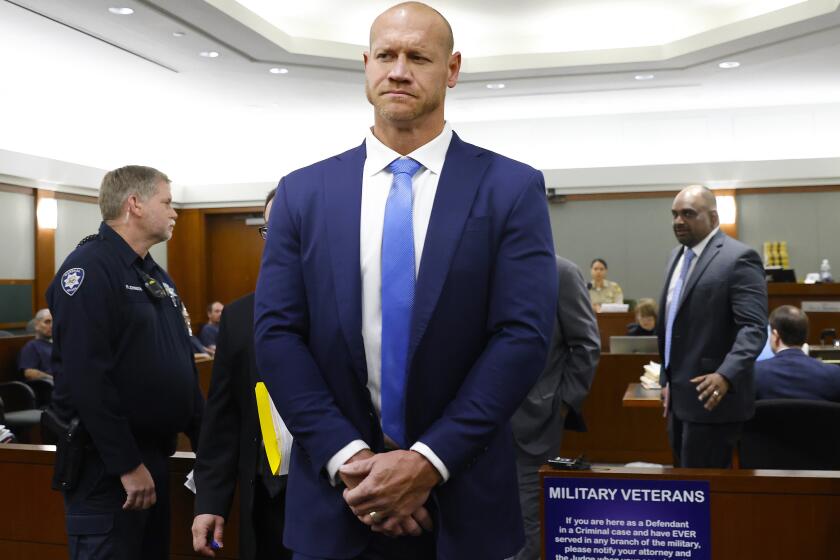Will SD have its first Latino mayor?
Bob Filner won last year’s mayoral contest with overwhelming support from Latinos who often chanted “Sí se puede” (Yes we can) at his campaign stops, which led Filner — who is white — to jokingly boast that he would be San Diego’s first Latino mayor.
With Filner resigning because of a sexual harassment scandal, city voters now have the opportunity to actually elect their first Latino mayor with City Councilman David Alvarez and former City Attorney Mike Aguirre among the top contenders. Each would represent the first nonwhite San Diego mayor to be elected since California became a U.S. state in 1850.
The importance of the Latino vote in the Nov. 19 special election can’t be overstated given how influential it was for Filner’s victory and Alvarez may be the candidate best positioned to take advantage of the political sea change. The young Democrat’s parents immigrated from Mexico, he grew up in Barrio Logan and he currently represents many of the city’s minority-rich southern neighborhoods.
That doesn’t mean his rivals are ceding the Latino vote. Qualcomm executive Nathan Fletcher, also a Democrat, has the backing of several prominent Latino leaders while Councilman Kevin Faulconer, a Republican, gave part of his speech in Spanish when he announced his candidacy earlier this month.
Many Latinos are excited about the chance to elect one of their own while others caution that Latinos aren’t a uniform voting bloc that will simply cast a ballot for a Latino.
Antonio Martinez, a board member for the San Ysidro School District, said the time is now for the city to back a Latino and that’s why he endorsed Alvarez.
“That would be a significant change and, more importantly, it would be an honor to have a first Latino mayor,” he said. “Actually I’m curious as to why it never happened before. …I would say it would represent the community a lot more and it would show a lot of progress.”
Assemblywoman Lorena Gonzalez, who has endorsed Fletcher, said it’s more important to have somebody as mayor who will fight for issues important to Latinos rather than to elect a Latino.
“I think we have that in Nathan Fletcher and we have the best opportunity to move our city forward in a way that helps our community and the fact that somebody’s Latino is great and the fact that we have two Latinos on the ballot is great and I encourage them,” she said. “I hope we have more. But I think we’ve been faced as a community with this situation in the past and we’ve decided that we’re able to split and that that’s OK and we can still all move forward together.”
Special mayoral election
- How Faulconer won it
- Faulconer brings city to familiar ground
- Map: How each precinct voted for mayor
- Faulconer win has lessons for state GOP
- Faulconer wins mayor’s race
- Editorial: A new mayor for San Diego
Final election results, complete coverage
History has shown that Latinos aren’t going to just vote for a candidate because he or she is Latino. Filner is perhaps the best example. Even in cases where he faced a Latino challenger, Filner continued to win re-election and represented southern San Diego in Congress for 20 years. While he stood accused of sexual misconduct by numerous women this summer, many of the supporters who stuck with him to the end were Latinos.
The potential pool of Latino voters has grown steadily in recent years. Latinos accounts for 30.5 percent, or 409,000, of the city’s residents compared to 42.6 percent, or 570,000, non-Hispanic whites, according to the 2012 American Community Survey released by the U.S. Census Bureau.
Latino voters could be the key to winning the special election — if they show up to vote. Minority communities typically have lower voter turnout compared to whites and that is particularly true in nonpresidential elections.
A U-T San Diego/10News poll released Monday had Alvarez leading the way among Latinos with 42 percent of likely Latino voters picking him. Fletcher was second with 23 percent support among Latinos followed by Faulconer with 13 percent and Aguirre with 5 percent.
Among all voters, Fletcher led with 30 percent, Faulconer had 22 percent, Alvarez had 17 percent and Aguirre had 9 percent.
Alvarez, 33, has a life story familiar to Latinos with fresh roots in San Diego. Seeking a better life for their family, his parents immigrated in the 1970s from the Mexican state of Jalisco. His father worked as a farmworker.
“In this city there’s a lot of people struggling so I think my story, the values that my parents taught me, really resonate with everybody throughout the city,” Alvarez said. “That’s certainly the story of our country, right? It’s what we’re founded on so I think we should be very proud that in the eighth largest city in the country we have someone who is a son of immigrants who has the potential to become mayor.”
Still, Alvarez said he doesn’t think his ethnicity will be a factor in the race.
“I would hope that it actually doesn’t make a difference because a mayor represents all people, and that’s what I’ve done on the council,” he said. “ …In this country we’ve come so far, and while ethnicity might play a role in the values of an individual …I think, as a democracy, we elect the best candidate and that’s why I’m running for mayor.”
Aguirre, 64, traces his Latino heritage to his Mexican grandfather who came to the United States in 1918 and raised his family in San Diego. Aguirre met labor leader Cesar Chavez while a student at UC-Berkeley and later worked for him as a lawyer.
Like Alvarez, Aguirre said ethnicity shouldn’t matter when choosing the next mayor.
“For me, I would like to argue that the very best candidate won on the merits and that candidate just happened to be Latino,” Aguirre said. “We want to live in a world in which the best candidate gets elected and the Latinos are voting for the best candidate, not just because he is a Latino. And I think that’s where we are today because it’s illustrated by the fact that Filner had huge support in the Latino community.”
This is the second year in a row the San Diego mayor’s race has provided an opportunity for a first. Then-Councilman Carl DeMaio and District Attorney Bonnie Dumanis vied to become the first gay mayor last year but each fell short. Ironically, in the June 2012 primary, Filner easily defeated both of them in the voting precincts in and around Hillcrest, the heart of the LGBT community.
Will the same fate befall Alvarez and Aguirre?
At least one prominent Latino leader — state Sen. Ben Hueso — doesn’t think either candidate is the best choice for mayor. He’s backing Fletcher.
“We need a viable candidate and we need candidates that will actually lead the city in the right direction, and that’s the difference,” Hueso said. “I think that we have two (Latinos) on the ballot, which is a step in the right direction. We need more Latinos to run in the future. …I think there’s a lot of talent in our community that can step up and do that job. Unfortunately, we didn’t get them to run in this election. Maybe next time.”
Hueso’s criticism should be taken with a grain of salt. Alvarez defeated Hueso’s brother, Felipe, in the 2010 City Council race.
Other Latino leaders feel Alvarez is the real deal.
“Now is the time. He is the face,” said National City Councilwoman Alejandra Sotelo-Solis. “(For Alvarez) and people like myself who have been working to mobilize our communities, it feels right. This is why we work so hard in our daily lives to make a difference, to be positive role models, making the contribution. It’s not for upward mobility. It’s because the opportunity is there to make that change and if you are the decision maker that helps dictate what and how the agenda will move forward and how you can empower others to make their lives better and easier, and to improve their quality of life, then why not?”
Staff writers Roxana Popescu and Lori Weisberg contributed to this report.
Top headlines by email, weekday mornings
Get top headlines from the Union-Tribune in your inbox weekday mornings, including top news, local, sports, business, entertainment and opinion.
You may occasionally receive promotional content from the San Diego Union-Tribune.
